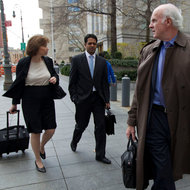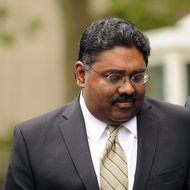 Jin Lee/Bloomberg NewsPatricia A. Millett, left, Samid Guha and Terence Lynam, lawyers for Raj Rajaratnam, outside a federal court in Lower Manhattan.
Jin Lee/Bloomberg NewsPatricia A. Millett, left, Samid Guha and Terence Lynam, lawyers for Raj Rajaratnam, outside a federal court in Lower Manhattan.
9:52 p.m. | Updated
A lawyer for Raj Rajaratnam appeared before a judicial panel in a Lower Manhattan courtroom on Wednesday in a final effort to keep her client out of prison while he appealed his conviction on charges of insider trading.
The lawyer came prepared to discuss complex legal concepts related to the Fourth Amendment of the Constitution and Title III of the Federal Wiretap Act. Instead, all the judges wanted to discuss was whether there was a risk that Mr. Rajaratnam, if allowed to remain free on bail, would flee to his native Sri Lanka.
“Wouldn’t he rather be living as a centimillionaire in his own country rather than as a convict in a jail?” Judge Dennis Jacobs asked Patricia A. Millett, the lawyer for Mr. Rajaratnam.
Mr. Rajaratnam, who did not attend the hearing, is set to report to a federal penitentiary in Ayer, Mass., on Monday to begin serving his 11-year sentence. A jury convicted him earlier this year of orchestrating an enormous insider trading conspiracy at his hedge fund, the Galleon Group.
Three judges on the United States Court of Appeals for the Second Circuit are reviewing the trial court judge’s ruling that denied Mr. Rajaratnam bail pending the appeal of his conviction. If the panel rules in his favor, Mr. Rajaratnam will remain free while his case wends its way through the appellate process, which could take a year.
 Andrew Gombert/European Pressphoto AgencyRaj Rajaratnam, the founder of the Galleon Group, was convicted of insider trading earlier this year.
Andrew Gombert/European Pressphoto AgencyRaj Rajaratnam, the founder of the Galleon Group, was convicted of insider trading earlier this year.
Mr. Rajaratnam’s central argument is that federal authorities improperly obtained judicial authorization to wiretap his telephone and secretly record conversations between him and those accused of being his accomplices.
But the panel of judges at the appeal focused on Mr. Rajaratnam’s risk of flight.
Ms. Millett said he would not flee to Sri Lanka because he had no reason to go there. She pointed out that all of his family members were in the United States and that while he had an apartment in Sri Lanka, it was on the market.
“He can’t even get there,” she said. “His passport was surrendered.”
Jonathan Streeter, a federal prosecutor arguing on the government’s behalf, said that Mr. Rajaratnam had strong ties to Sri Lanka, had shown a disrespect for the law and had the financial wherewithal to flee.
There was some discussion of the validity of the government’s wiretap application, which will form the core of Mr. Rajaratnam’s appeal. The government argued that the appeals court should defer to the trial court judge, Richard J. Holwell, who concluded that even with errors in the application, the government appropriately obtained wiretap authorization.
Ms. Millett, the lawyer for Mr. Rajaratnam, countered that the government showed reckless disregard for the law in omitting crucial information about its investigation when asking for wiretap approval. As a result, the government should not have been able to use the wiretaps as evidence at trial.
“If there is a failure to do any of the requirements in Title III, it must be suppressed,” Ms. Millett said.
The panel said it was reserving judgment. A decision is expected before the week’s end.
Article source: http://dealbook.nytimes.com/2011/11/30/in-rajaratnam-hearing-judges-focus-on-flight-risk/?partner=rss&emc=rss